10 Best Protein Bars for Weight Loss
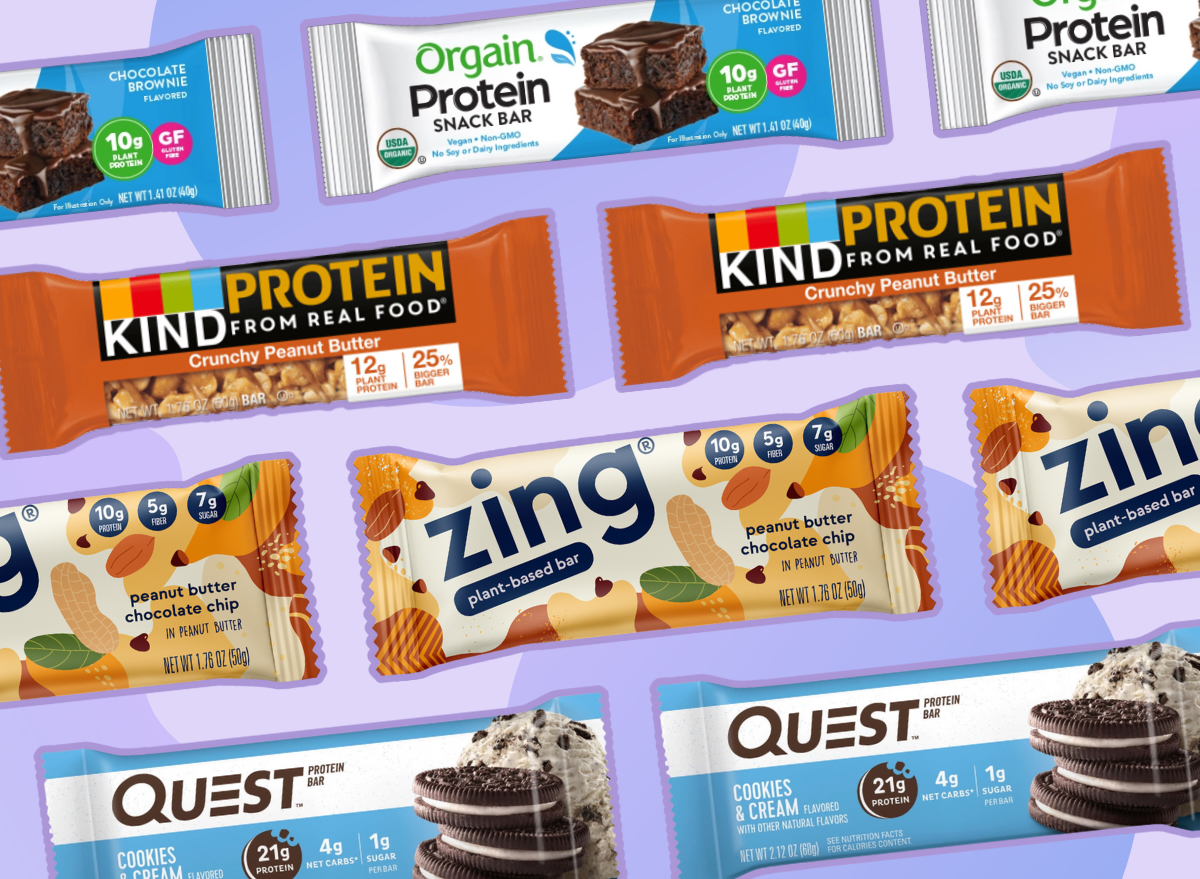
If your goal is to slim down, eating the right healthy snacks is just as important as what you choose for your main meals. That's because snacks contribute about a third of our daily calories, so opting for nutrient-dense options that help keep you satisfied can make a big difference in reaching your weight-loss goals. One of the best snacks for weight loss is a wholesome protein bar that satisfies hunger and keeps you fueled.
Research shows that diets with optimal protein intake—around 1.2 to 1.6 grams per kilogram of body weight (or 0.5 to 0.7 grams per pound)—can help with weight management and reduce body fat while lowering the risk of chronic health conditions. Protein bars are an easy, convenient way to meet your needs, especially when you're looking for a filling snack between meals.
To help you make smarter choices, we've rounded up the 10 best protein bars for weight loss, according to dietitians. These picks contain at least 10 grams of protein, no more than 300 calories, minimal added sugar (under 10 grams unless post-exercise), and at least 3 grams of fiber. Plus, they're made with wholesome ingredients like nuts, seeds, and whole grains to keep you satisfied and support your overall health.
Read on, and for more, don't miss Here's Exactly How I Eat Over 100 Grams of Protein Every Day.
In This Article
- The 10 Best Protein Bars for Weight Loss
- How We Chose the Best Protein Bars for Weight Loss
- How Does Protein Support Weight Loss?
- How Much Protein Should You Eat To Lose Weight?
The 10 Best Protein Bars for Weight Loss
RXBar Peanut Butter Chocolate
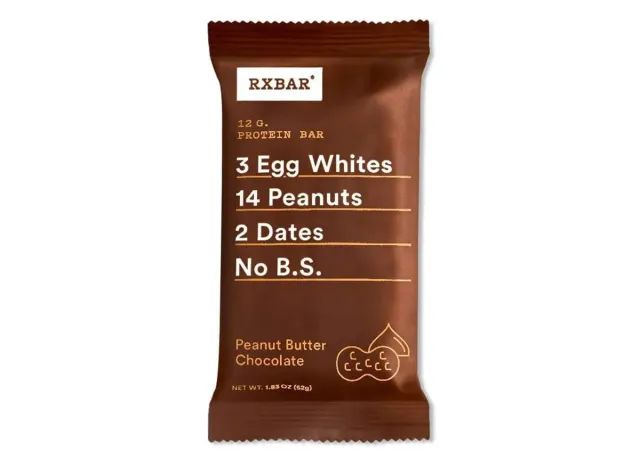
Calories: 210
Total Fat: 9 g (Saturated Fat: 2 g)
Sodium: 310 mg
Carbohydrates: 23 g (Fiber: 5 g, Sugar: 14 g [Added Sugar: 0 g])
Protein: 12 g
RXBars are whole-food bars made with egg whites, dates, peanuts, and cocoa, making them a more natural choice compared to many other protein bars. With 12 grams of protein and 5 grams of fiber, these bars help keep you satisfied and support weight-loss goals by curbing hunger between meals.
Quest Cookies and Cream Protein Bar
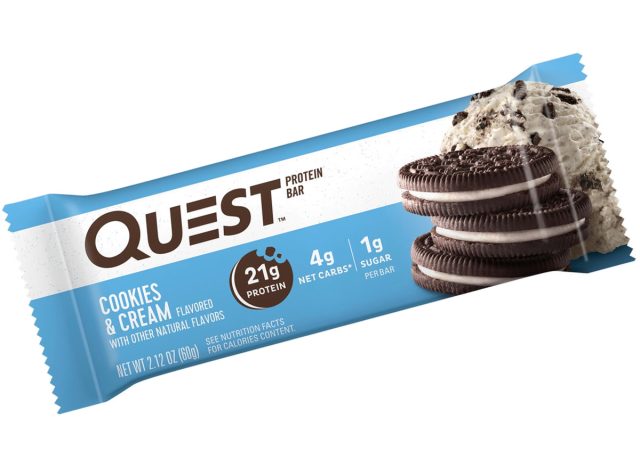
Calories: 190
Total Fat: 8 g (Saturated Fat: 2.5 g)
Sodium: 290 mg
Carbohydrates: 22 g (Fiber: 13 g, Sugar: 1 g [Added Sugar: 0 g])
Protein: 21 g
The original protein bars by Quest are high in both protein and fiber. This combination helps curb your appetite and provides sustained energy, making it easier to avoid overeating. With no added sugar, these bars are also ideal for those managing carbs to support their weight goals. Made with high-quality dairy-based protein, they deliver essential amino acids your body needs. Quest Bars are sweetened with erythritol, stevia, and sucralose for a satisfying, low-sugar option.
Power Crunch Pro Peanut Butter Fudge
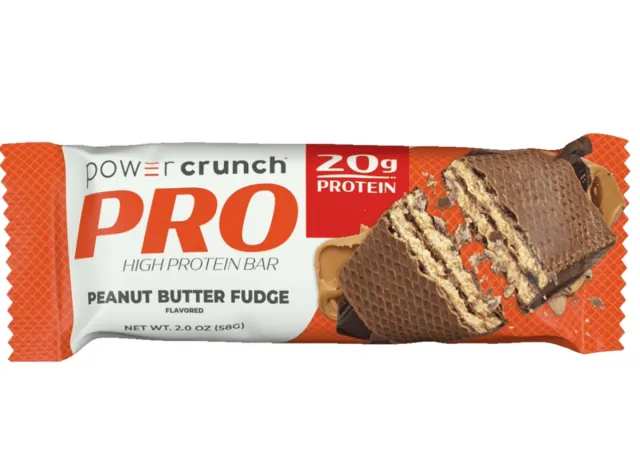
Calories: 300
Total Fat: 21 g (Saturated Fat: 10 g)
Sodium: 220 mg
Carbohydrates: 15 g (Fiber: 2 g, Sugar: 4 g [Added Sugar: 4 g])
Protein: 20 g
Power Crunch protein bars are a favorite of registered dietitian and certified athletic trainer, Dana Angelo White, MS, RD, ATC. "These bars are, come in great flavors, and offer up a good dose of protein. The protein source in these bars is primary whey protein, so the protein will be digested and absorbed slowly to help keep you satisfied longer," notes Angelo White. The bars are also sweetened with stevia so added sugars are lower than many other bars.
KIND Protein Crunchy Peanut Butter
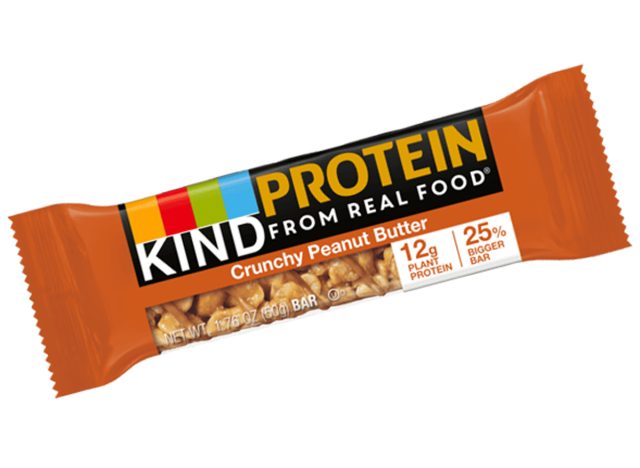
Calories: 250
Total Fat: 18 g (Saturated Fat: 4 g)
Sodium: 135 mg
Carbohydrates: 17 g (Fiber: 6 g, Sugar: 7 g [Added Sugar: 5 g])
Protein: 12 g
KIND's Protein From Real Food bar packs in 12 grams of protein and 6 grams of fiber to help keep you full and satisfied. The protein comes from wholesome ingredients like peanuts, soy protein isolate, and nonfat milk powder. With just 5 grams of added sugar, this calorie-controlled bar is a smart choice for supporting weight-loss goals
Aloha Chocolate Chip Cookie Dough Protein Bar
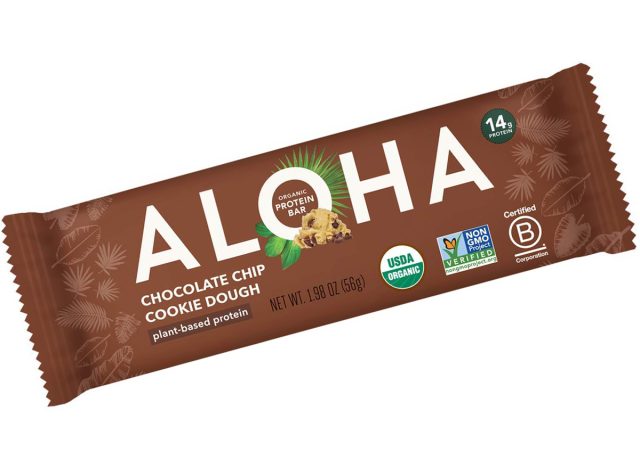
Calories: 240
Total Fat: 11 g (Saturated Fat: 2.5 g)
Sodium: 105 mg
Carbohydrates: 25 g (Fiber: 10 g, Sugar: 5 g [Added Sugar: 4 g])
Protein: 14 g
"Packed with 14 grams of plant-based protein, 10 grams of fiber for gut health, and only 3 grams of added sugar, Aloha Protein Bars are a great choice," says Patricia Bannan, MS, RDN, author of From Burnout to Balance. They are also vegan, gluten-free, and USDA-certified organic.
Clif Builders Bar Chocolate Mint
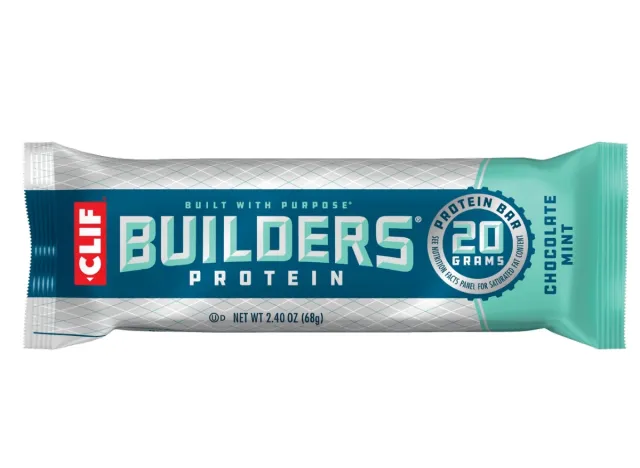
Calories: 280
Total Fat: 9 g (Saturated Fat: 6 g)
Sodium: 200 mg
Carbohydrates: 31 g (Fiber: 3 g, Sugar: 17 g [Added Sugar: 17 g])
Protein: 20 g
While Clif Builders Bars exceed the guidelines for added sugar, dietitian Angelo White recommends them as a good option for active individuals post-exercise. Made with soy protein isolate and soy protein concentrate, these bars provide all essential amino acids to support muscle recovery. With 20 grams of protein and 3 grams of fiber, they can help you refuel while keeping your calories in check after a workout.
Zing Peanut Butter Chocolate Chip Nutrition Bars
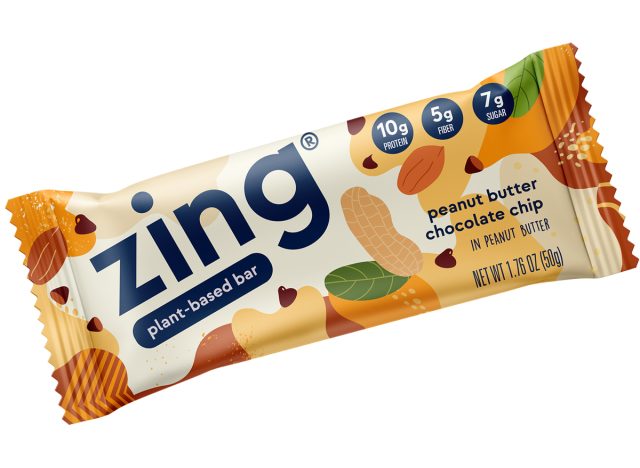
Calories: 220
Total Fat: 11 g (Saturated Fat: 2.5 g)
Sodium: 110 mg
Carbohydrates: 23 g (Fiber: 5 g, Sugar: 7 g [Added Sugar: 4 g])
Protein: 10 g
Zing Plant-Based Bars are vegan and made with quality ingredients like peanuts, tapioca fiber, brown rice protein, and medium-chain triglycerides. These bars keep added sugars minimal, relying on monk fruit concentrate for sweetness, which helps keep calories in check. With their nutrient-dense profile, Zing Bars are a smart option for plant-based eaters looking to support their weight-loss goals
:ratio Toasted Almond Crunchy Bar
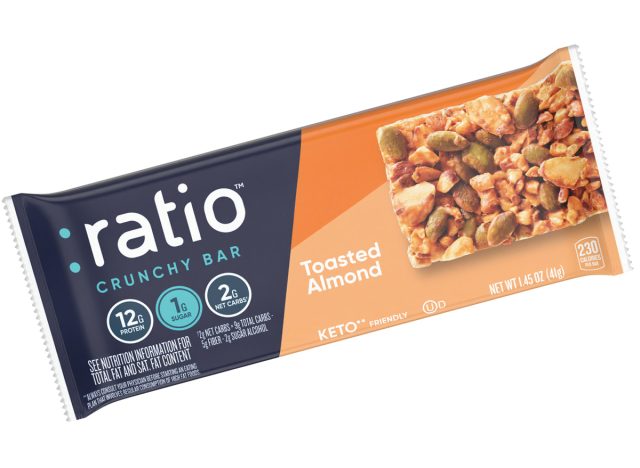
Calories: 220
Total Fat: 17 g (Saturated Fat: 5 g)
Sodium: 170 mg
Carbohydrates: 9 g (Fiber: 3 g, Added Sugar: 1 g)
Protein: 12 g
Made with almonds, pumpkin seeds, soy protein isolate, and whey protein isolate, :ratio Crunchy Bars are a great option for anyone trying to lose weight following a low-carb lifestyle. With just 1 gram of sugar, 9 grams of carbohydrates, and 12 grams of protein, it's perfect for supporting weight-loss goals. Plus, it's gluten-free and vegetarian, making it a versatile option for a variety of dietary needs.
Orgain Organic Protein Bar Chocolate Brownie
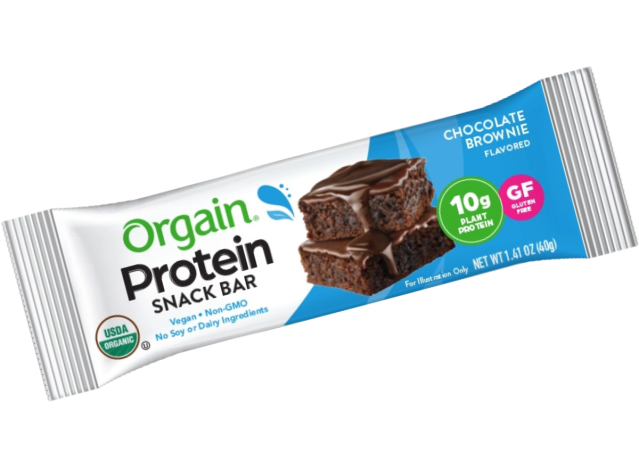
Calories: 150
Total Fat: 5 g (Saturated Fat: 1.5 g)
Sodium: 120 mg
Carbohydrates: 19 g (Fiber: 1 g, Sugar: 6 g [Added Sugar: 6 g])
Protein: 10 g
Even though Orgain Protein Bars don't meet our guidelines for fiber, they are calorie-controlled and pack in 10 grams of protein. What's more, the protein comes from organic brown rice protein, pea protein, and chia seeds. Added sugars are kept low because the bars are sweetened with erythritol, as well as other sweeteners.
Dang Lemon Matcha Bar
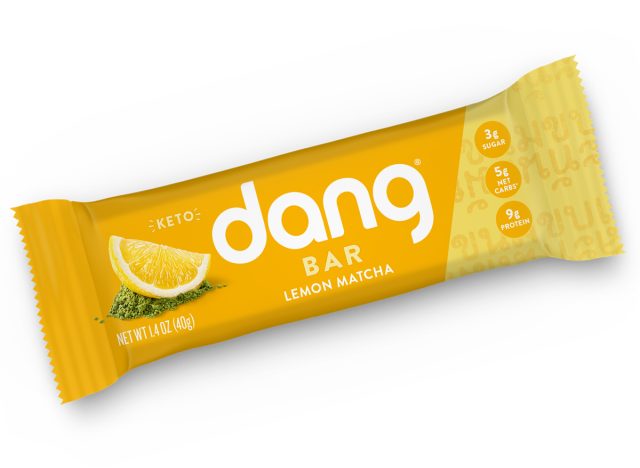
Calories: 210
Total Fat: 15 g (Saturated Fat: 5 g)
Sodium: 40 mg
Carbohydrates: 11 g (Fiber: 6 g, Added Sugar: 0 g)
Protein: 9 g
Dang bars are just shy of our 10-gram protein guideline by 1 gram; however, we like that the bar is made with almonds, pea protein, and chia seeds and packs in a whopping 6 grams of fiber. The fiber and protein combo with help keep you satisfied, so you're less likely to overeat.
How We Chose the Best Protein Bars for Weight Loss
To help you find a high-protein bar that can help you lose and maintain a healthy weight, here's what to look for:
- High protein counts: Look for a bar that provides at least 10 grams of protein. Since meals should provide 20-30 grams of protein, you're looking for a bar with about half of the protein that a meal should provide.
- Moderate calories: Make sure the protein bar has no more than 300 calories. Snacks should be kept to up to 250-300 calories to help ensure that you don't exceed your daily caloric budget.
- Low in added sugar: Be sure to choose a protein bar that limits added sugars to no more than 10 grams or 2.5 teaspoons. Added sugar is digested and absorbed quickly, and provides no staying power, so you'll likely be hungry soon after eating. One exception is if you are eating a snack post-exercise, as it's okay to have more added sugar to help replenish depleted glycogen stores after exercise.
- High in fiber: When it comes to fiber, choose bars with at least 3 grams of fiber. Fiber will help keep you satisfied, improve your GI health, and help reduce the risk of chronic diseases.
- Made with wholesome ingredients: Bars that have more natural ingredients should be prioritized, like nuts, seeds, and whole grains.
How Does Protein Support Weight Loss?
Protein plays a key role in weight loss by promoting satiety, stabilizing blood sugar levels, and increasing your metabolic rate through its higher thermic effect of food (TEF). It helps prevent muscle loss, which is crucial for maintaining calorie-burning lean muscle mass.
"As you lose weight, you also slow your metabolism as calorie-burning muscle tissue is lost," The Nutrition Twins, Tammy Lakatos Shames, RD, CDN, CFT, and Lyssie Lakatos, RD, CDN, CFT, tell us. "Since getting adequate protein helps spare the lean muscle tissue loss, you are more likely to also keep your metabolism from slowing."
By keeping hunger and cravings in check, protein makes it easier to manage calorie intake and stick to weight-loss goals. For individuals with obesity, studies show that increasing protein while reducing carbohydrates and dietary fat intake may help the body burn fat more efficiently, reduce fat storage, and lower overall calorie intake. Incorporating high-protein foods like eggs, fish, poultry, nuts, and seeds into meals and snacks can optimize your efforts and support overall health.
How Much Protein Should You Eat To Lose Weight?
According to experts, the minimum protein intake you should have per day is 0.8 grams of protein per kilogram of body weight. For someone weighing 150 pounds, this would translate to 54 grams of protein per day."This is suitable for most individuals and helps with muscle preservation and appetite control," Trista Best, RD, a registered dietitian with Balance One Supplements tell us.
However, protein needs are slightly higher for those who are highly active or with a significant amount of weight to lose. Research shows that those looking to lose weight and reduce body fat should aim for 1.2 to 1.6 grams per kilogram of body weight (or 0.5 to 0.7 grams per pound), which translates to 75 to 105 grams of protein per day for someone weighing 150 pounds.
Why Trust Eat This, Not That!?
Eat This, Not That! is committed to creating high-quality content that you can trust to be accurate, properly researched, routinely reviewed, and updated with the latest information. Our writers, editors, and medical and/or certified experts consider this to be an unwavering promise we make to our readers in the pursuit of delivering impactful and meaningful content.









